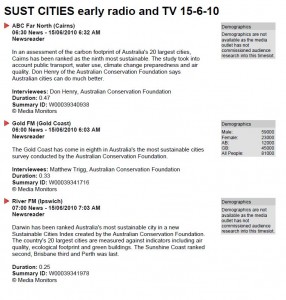A Citizen of Hootville recently asked for media monitoring company recommendations. Alas, in terms of a specific company we have none. Do you? If so, write your thoughts under this post.
To explain: media monitoring companies are paid by clients to monitor media in all forms and report any mentions of companies, issues or individuals that may be of interest. Eg: Squiggle’s NGO Dachshunds Without Leashes has an ongoing account with Media Monitors. The brief is to look out for mentions of: dachshunds, new off leash parks, Dachshunds Without Leashes, rival organisation Felines Without Empathy and of course Squiggle himself.
As soon as Media Monitors picks up any mention of these they alert Squiggle. It allows Squiggle to get on with more important things (Davos summits etc) yet be aware of how his issues are portrayed in the media. Squiggle can then order full transcripts or just get the vibe of the coverage from the summaries he receives. The reports should be sent ASAP.
Media monitoring is expensive and still they miss stuff. Most nonprofits can’t afford it. But here’s the thing: most of those shelling out the dollars for media monitoring are wasting their money as they don’t use it to full advantage.
Most media monitoring clients use it as a way to keep abreast of how the media is covering issues and organisations including their own. reps are met, budgets approved and contracts signed. Emails come in, get forwarded around, the occasional link is clicked and for a while everyone feels important and informed. Usually though, the media monitoring emails start stacking up like a piles of unread newspapers yellowing in the corner. Suddenly the monitoring ends up being a source of guilt rather than inspiration.
Inspiration? Whatever do you mean? Well if you are media monitoring (paid or unpaid) here’s how to get the most of it:
Use it to secure fast-breaking media opportunities: see who is covering issues to which you can add your perspective NOW. This is most relevant to radio but works across all media. ABC local radio spent 8 minutes on one of your issues this morning? Call the drive producer and offer your CEO for interview. Or perhaps they’d appreciate a background briefing? This is the best justification for media monitoring but it is rarely used for this purpose.
Use it to broaden your list of media contacts. See who covers your issues, learn who they speak to, the angles that are important to them and make contact with them before they go back to their usual suspects. Good news: we suspect that there is more coverage of your issue than you realise. This means more opportunities.
Use it to find interesting content for your website, eMarketing and social media. Subscribers look to you as a source of information – piggyback off the media’s efforts to keep your peeps in the loop.
As for some free alternatives we can say this: Google Alerts and a office radio can go a long way. So too can some helpers – volunteer or staff – who are charged with reporting in when they come across appropriate coverage.
Will you get value out of it? Try running Google Alerts as an alternative for web-based material. It’s free and fast and reasonably reliable. See how quickly your organisation turns the reports into something of real value. If you have what it takes, it may be worth the dollars – otherwise, it probably ain’t.

